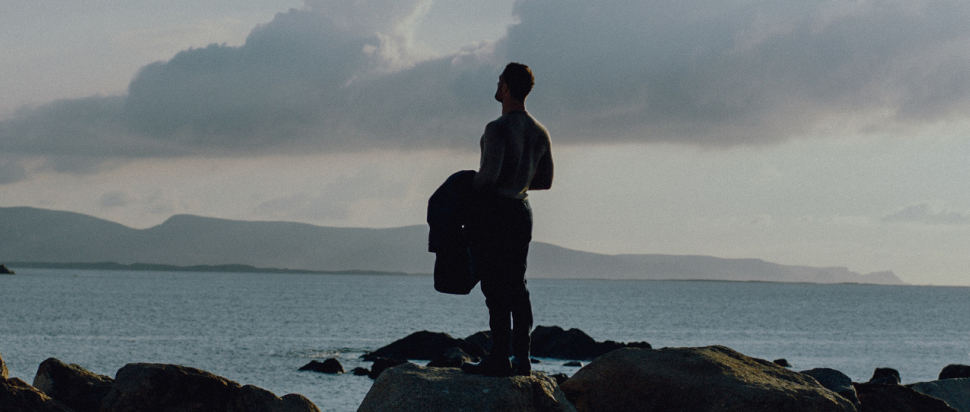Antonia Campbell-Hughes on It Is in Us All
We delve into the dark psychological thriller It Is in Us All with Irish filmmaker Antonia Campbell-Hughes, who directed, wrote, and acted in the film
Antonia Campbell-Hughes, writer-director of the Irish psychological drama It Is in Us All, has no difficulty talking about her film, but she’s less keen on defining it. Her feature debut details the unravelling of Hamish (Cosmo Jarvis), a tightly-wound Londoner, who suffers a car crash in rural Donegal while visiting a home left to him by his late aunt. Physical wounds soon trigger emotional ones. “I saw it like he is cracked open, and that crack suddenly buys him time outside of himself,” says Campbell-Hughes. ”So his time then is bought time where he can actually tiptoe outside of his own locked shell.”
Soon Hamish is questioning his heritage, his masculinity, and his relationship with life and death, in a film that is not just hard to define but one that questions the necessity of definition itself. In terms of reference points – aside from the multitude of painters and photographers that influenced the film's austere, heavy mood – Campbell-Hughes initially pitched It Is in Us All as science fiction in a pastoral setting, but found her vision being misunderstood. “I think I was trying to push an understanding of what I was trying to do. Of course, people go, ‘So are there aliens?’ And it’s like, well no, because science fiction is not the word.”
She tries again to define it: “There’s a writer called Mark Fisher, he wrote a book called The Weird and the Eerie. I actually only picked it up after the film. I feel like he was writing what I was communicating but just more fluently. We don’t have a section for it in the video store (sorry to be 1990s about it), but 'the weird and eerie' is a genre that’s not quite science fiction and not quite drama; it’s like a tonality that we understand – like if we don’t sleep for four days, everything takes on a different tone. I think it’s an exceptional space to be in.”
Body horror also comes to mind, as Hamish’s “cracked open” self pushes him out of his own body and into a new, uncomfortable state of being. Hamish mends his post-accident injuries (including a nasty open fracture) in a constrictive, amateurish fashion, repressing his woundedness out of sight. “Body horror sounds so negative,” Campbell-Hughes says, again struggling with the inaptitude of genre descriptors. “It’s sort of like body horror… poetry? I find that when we see the injury, when we see the illness, when we see the destruction, it’s an analogy for a deep, profound vulnerability.”
Vulnerability isn’t something Campbell-Hughes shies away from, and not just in terms of putting her own experiences on screen. “I was born in Donegal, and we left when I was two; I grew up in Switzerland and Germany, and so I had this removed idea of where I came from,” she explains. “I’ve always been really interested in people who feel dislocated from their heritage or roots.” But beyond that, Hamish pushing against the boundaries of his myopic, gendered self-perception isn’t a foreign emotional state for Campbell-Hughes.
“At the end it says ‘For Peter’, and that is my father, but it’s not this very emotional thing,” she explains. “It was more that he was a very complex man, and he died many years ago, but I spent that time after his passing trying to understand him. When you’re a child or a teenager and your parent passes, you’ve only got a very simple relationship. But after that, you try to really understand who the person was and how they operated, and he was quite like how Hamish is. Hamish was a construct of many things, but the story was about trying to excavate and understand those nuances where there is a complexity with the male.”
It’s not a discovery that can happen in isolation. Hamish’s journey is defined by a burgeoning connection with Evan (Rhys Mannion), the 17-year-old driver who collided with him, as well as the grieving mother (played by Campbell-Hughes) of the boy who lost his life in the crash. The three performances define the film in nuanced ways, always independently disoriented, but making unexpected connections that feel fittingly nebulous and confused. Early reactions to the script affected the execution of Campbell-Hughes’s vision. “Initially, Evan’s character was 14, so that didn’t go down very well. People really baulked at that. They were instantly like, ‘No, he has to be older.’”
But Campbell-Hughes wouldn’t alter the intimate nature of Hamish and Evan’s relationship. “Yeah it is sensual, I’m not going to back down on that,” she says. “It is really sensual. I want this to have a very common appeal. It is about the common ground of experience. That is a sensuality that can happen that is ageless, and genderless, and placeless. And it is about just the connectivity of being seen and sharing, and something that happens when you’re compromised.”
It Is in Us All screens at Everyman, 15 Aug, 6.30pm; Filmhouse, 16 Aug, 12pm; tickets at edfilmfest.org.uk
